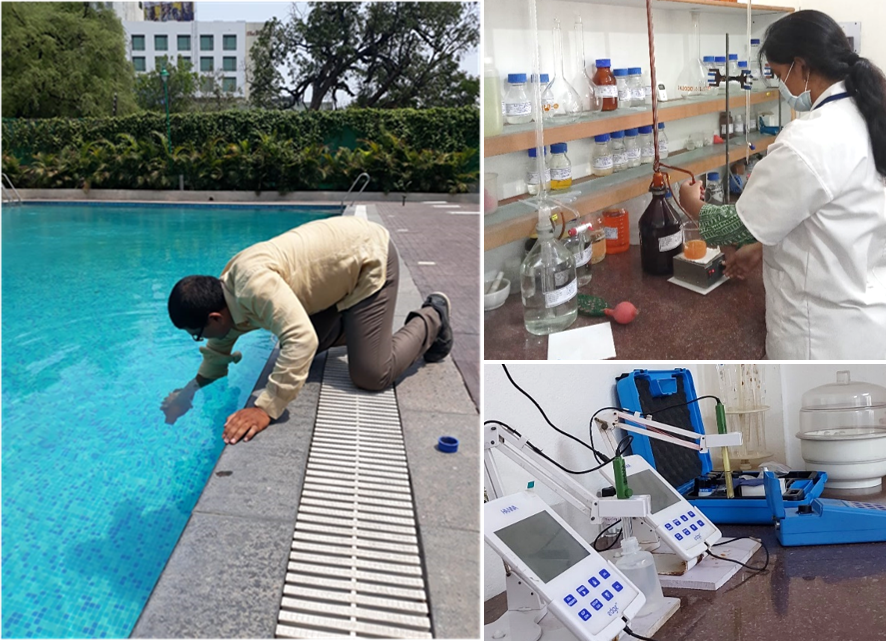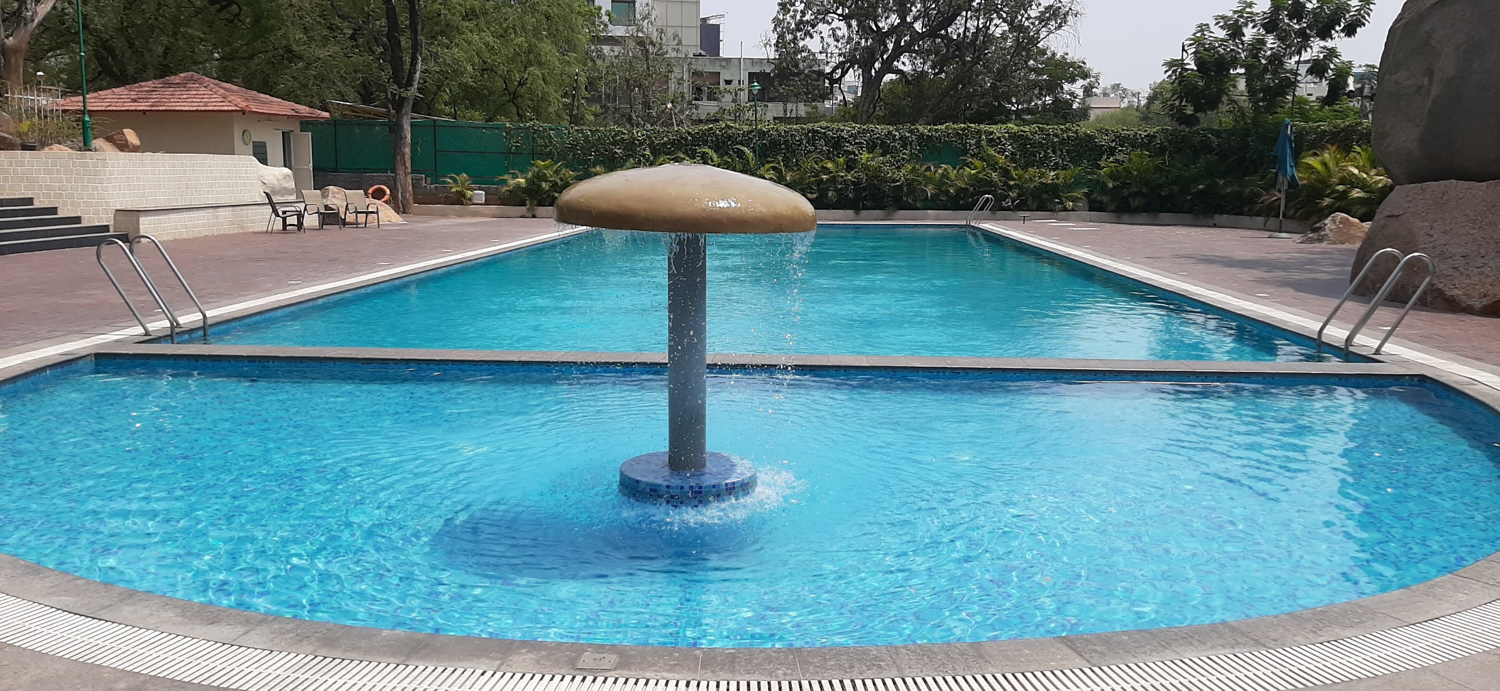Pool Water Chemistry (PWC) tests
Rationale:

Swimming pool operators monitor key water quality parameters frequently to adjust dosing of various chemical additives and take corrective action to maintain a safe and comfortable recreational environment for bathers. Some swimming pool systems have built-in arrangements for automatic monitoring of key parameters and adjustment of dosing. Even then pool operators may have to check for critical parameters several times a day, when the swimming pool is in use. In addition, laboratory testing of chemical parameters critical for operational efficiency and bather comfort is desirable.
This test is designed to test important general and chemical parameters relevant for swimming pools. Optimum alkalinity buffers the pool water so that the pH stays within desirable range. Too little alkalinity means inadequate buffering and the pool pH may quickly drift out of range. With excessive alkalinity there will be a tendency to for pool water pH to drift upwards. Optimum hardness balances potential for corrosion and scaling. Monitoring of stain producing minerals like, copper, iron, and manganese is for timely corrective action.
Testing of general characteristics include several parameters that are important to maintain aesthetic quality of pool waters. Clarity of water is important for pool safety and aesthetics. Acidic or highly alkaline water is uncomfortable to the human eye. Electrical conductivity and total dissolved solids give global estimates of salinity which correlates with swimming pool operational practices, bather load, and presence of potentially undesirable substances and helps in interpretation of other chemical parameters. Sometimes, chlorine can combine with ammonia and nitrogenous substances primarily from swimmer waste and form chloramines.
Scope of this Testing Service:
-
In-lab measurement of the following parameters:;
- General characteristics: Colour, Odour, Turbidity, pH, Electrical Conductivity (EC) and Total Dissolved Solids (TDS).
- Chemical:
- Chloramines (combined chlorine), which is a disinfectant byproduct
- Alkalinity, Hardness, Calcium hardness, chloride, Iron; &
- Computation of Calcite/Langelier Saturation Index at 20, 25 & 30°C.
- Microbial testing is not included here, because samples for general and chemical quality of pool water cannot be combined with that for microbial testing. Simultaneous pool water bacteriogical monitoring (PWBM) is recommended.

Sample Required:
- Samples can be collected from your swimming pool in Greater Hyderabad Metropolitan (GHMC) area for a small fee. A 50% discount on sample collection service (CSC/GSC) fee, is available if PWB is ordered with pool side tests (PST).
- If you choose to collect your own sample, please read detailed Swimming Pool – Water Sample Collection Guide, copy of which can be downloaded from: https://www.ihs.org.in/lab/wqt/pdf/IHSLabSwPoolSampleCollectionGuide.pdf
- Briefly, about one litre sample collected in clean plastic, preferably amber coloured, bottle is required. In case of pools with uniform depth, select a zone around mid-point. If the pool has a shallow and deep end, select a zone around midpoint in-between the point where bottom of the pool slopes down and the deep end.
- Identify location of inlet (return jets) and avoid areas near them. Find a location away from inlets. Also avoid dead zones like a corner, or steps.
-
The wide mouth 1L amber coloured bottle for PWC should be clean, rinsed in distilled water, dried and sealed in polythene. No chemical additives in this bottle. Sterilisation is not essential. The bottle should be provided with a dark coloured carry bag and ice packs . Do not open the bottle until, ready to use.
- Note that the sampling collection bottles meant for testing potability of drinking water, are not suitable for this purpose, as those bottles carry a trace of deliberately added chlorine neutraliser such as sodium thiosulfate. The sampling bottle for pool water aesthetics test should be free of any chlorine neutraliser.
- Do not open the bottle until, ready to use.
- Rinse the PWC sampling bottle with pool water once before collecting sample.
- Hold the sample bottle near its base at an angle of 45 and carefully remove the cap. Plunge the bottle into the water elbow-deep, then turn it right side up to collect the sample vertically into water approximately 8 inches (20 cm) below the water surface.
- Wipe off water from outside the bottle, wrap it with ice packs and place inside dark polythene bag. Keep the sample bag away from sunlight.
- Deliver the sample to lab as soon as possible, preferably within six hours, and definitely not later than 24 hrs from time of collection.
- Samples should preferably be collected on a working day morning and rushed to the laboratory as soon as possible, to facilitate same day analysis.
Recommended frequency for independent (third party) tests:
Every 2 weeks.
Test Report:
Tests are usually completed in one working day. Report will be made available within 24-48 hrs.



To pick up sample collection bottle and/or schedule collection of samples: Email: ihslab@ihs.org.in with your address and contact telephone; OR WhatsApp: +919848011251; Or Call: 23211013/4.
